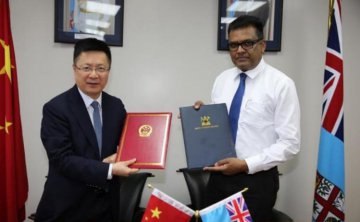Fijian Minister for Agriculture, Waterways and Environment Mahendra Reddy made the remarks while attending the hand-over of fencing materials to livestock farmers at the Legalega Research Station in Nadi, Fiji's third largest city, as part of the Ridge-to-Reef (R2R) Protection of Biodiversity from Free Animals program.
Reddy said that to achieve development objectives at the expense of Fiji's natural biodiversity was ill-advised as biodiversity was critical for sustainable development.
Agricultural activities like livestock farming, was a contributing factor to the loss of biodiversity needed to be mitigated, he said, adding that it is important that Fiji mainstreams biodiversity into all aspects of development, across areas such as agriculture, fisheries, forestry, tourism and waterways.
"The Food and Agriculture Organization of the United Nations (FAO) indicates that livestock is among the sectors with the highest impact on the biodiversity - the second most important driver of global biodiversity loss, by releasing about 14.5 percent of global greenhouse gases (GHG)."
The minister said that as much as animals were a part of Fiji's diversity, they also altered biodiversity, as livestock farming required much land and contributed towards the destruction of native plants, animal species and their habitat.
Livestock farmers received assistance to help fence their paddocks through the provision of fencing materials, funded by the GEF STAR Fiji R2R Project.
The Pacific Ridge to Reef program is a Global Environment Facility (GEF) multi-focal area program guiding coordinated investment of GEF grant funding across its focal areas of biodiversity conservation, land degradation, climate change adaptation and mitigation, sustainable land management, sustainable forest management, and international waters in the Pacific Small Island States (SIDS). It is a multi-agency initiative involving the United Nations Development Program (UNDP), the Food and Agriculture Organization of the United Nations, and the United Nations Environment Program (UNEP) as GEF implementing agencies.




















Latest comments